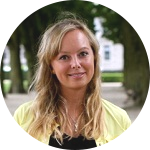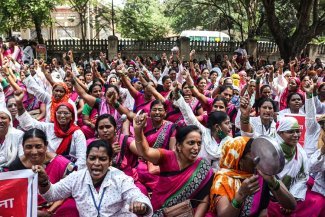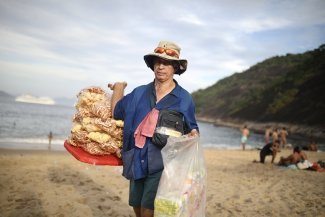Fleeing from war, political instability and persecution, every year thousands of Afghans refugees arrive in Belgium.
In 2013, almost 16,000 new asylum applications were filed in Belgium, with 9 per cent of applicants originating from Afghanistan, the largest country of origin for asylum seekers in Belgium according to the Office of the Commissioner General for Refugees and Stateless Persons in Brussels.
Just over half of those applicants were granted some sort of protection status.
They are the lucky ones.
For the past three months, nearly 200 Afghan refugees, some of whom have had their asylum applications rejected have been living rough in an old church in the centre of Brussels.
Twenty-three-year-old Mushtag Khaligyar, who has been living in Belgium for three years and is still waiting for his application to be accepted, speaks on behalf of his countrymen when he says he cannot go back.
“If I go back, the Taliban will kill me. I don’t have family there anymore. I am all alone.”
There are hundreds of other cases like this at the Béguinage Church in Brussels.
The refugees – which include men, women and children – stay at the church without heating or warm water, sleeping in tents provided by the city as they wait for their asylum applications to be processed. The children at this makeshift camp do not go to school.
“Those whose applications are rejected can introduce a new appeal but they have to have new motives. If the case is rejected again they can voluntarily leave the country. If they don’t, they risk being returned by force,” says Tine Van Valckenborgh, a spokesperson for the Office of the Commissioner General for Refugees and Stateless Persons.
But unable to work or study in Belgium these people remain in limbo.
“Even though they can very practically stay in Belgium while waiting for their application to be revised, they are still without status, without the possibility to work or to find a house. [Many live] in the street, and after a few months they leave the country,” Jean-François Tamellini, Federal Secretary of the Belgian union FGTB/ABVV told Equal Times.
Twenty-year-old Mohamed is the perfect example. Fluent in English and Dutch, he has some relatives living in Belgium but has already had his application rejected three times
“I just want to study here, work and pay taxes. If I go back to Afghanistan there is no future for me there,” he says.
Protests
In recent months, Belgium’s Afghan refugees have launched several demonstrations to draw attention to their plight including, in December 2013, a march to southern city of Mons, home to the Belgian Prime Minister Elio Di Rupo, and a three-day protest march from Brussels to the northern city of Ghent.
Belgian trade unions have written to the Prime Minister Di Rupo in support of the asylum seekers and have also offered logistical support during the various protests that have been organised.
Tamellini says that a number of Afghans were arrested during demonstrations and some were deported.
Van Valckenborgh says that asylum can only be granted to those who can prove that returning home poses a “real risk of persecution or serious harm”.
But it is known that at least one former Belgian asylum seeker, a man called Aref, was killed on his return to Afghanistan.
However, the UN refugee agency UNHCR believes that the security situation in Afghanistan is not safe in every part of the country at the moment and it remains difficult to assess the implications of the withdrawal of foreign combat troops scheduled by the end of 2014.
“The situation in Afghanistan remains volatile, security conditions remain unpredictable and human rights violations persist,” says Frederik Smets of UNHCR Brussels.
“All applications need to be treated with care, taking into consideration all necessary information on the situation in the country.”
“If it is not fully ascertained that return is safe, the claimant should be given the benefit of the doubt. After all, the question of return or no return may be a question of life and death.”









